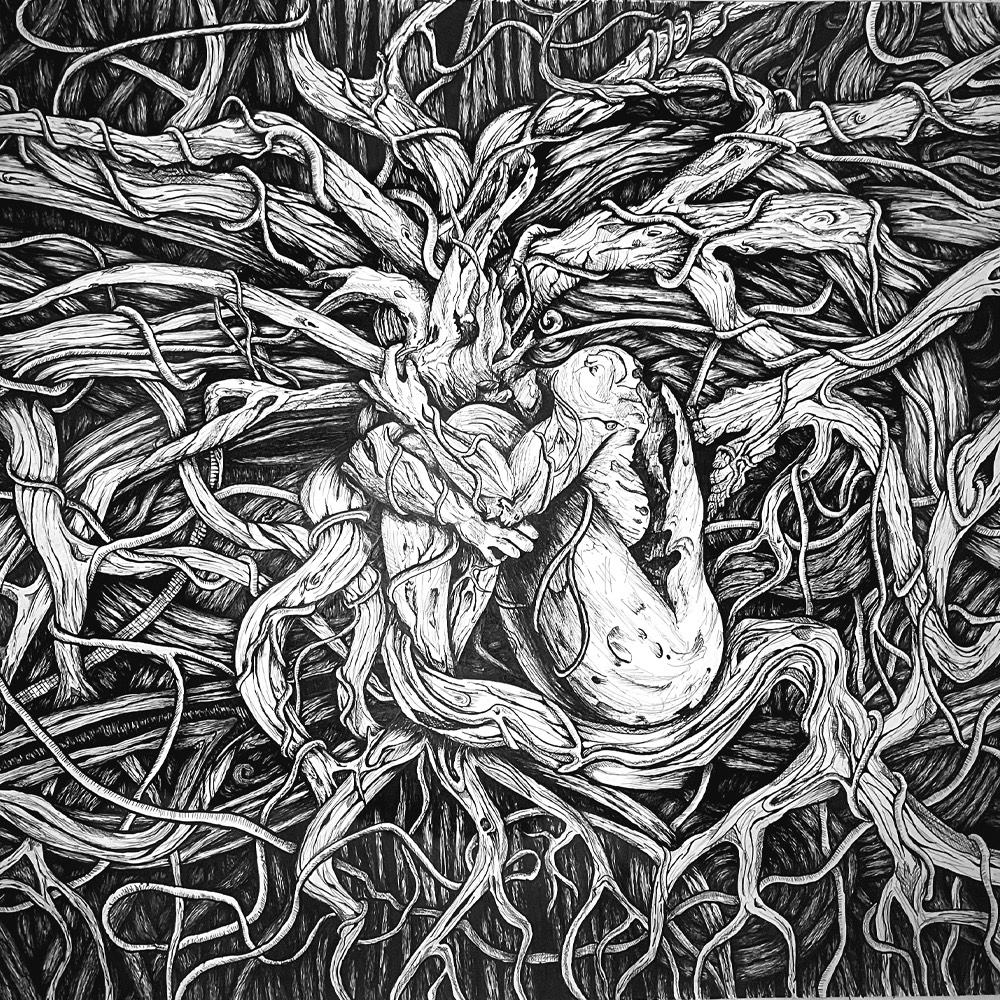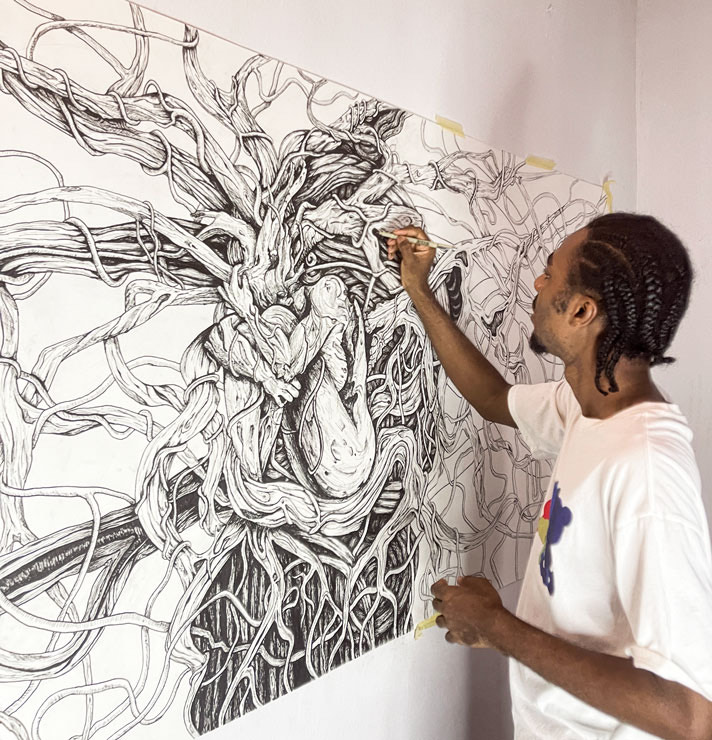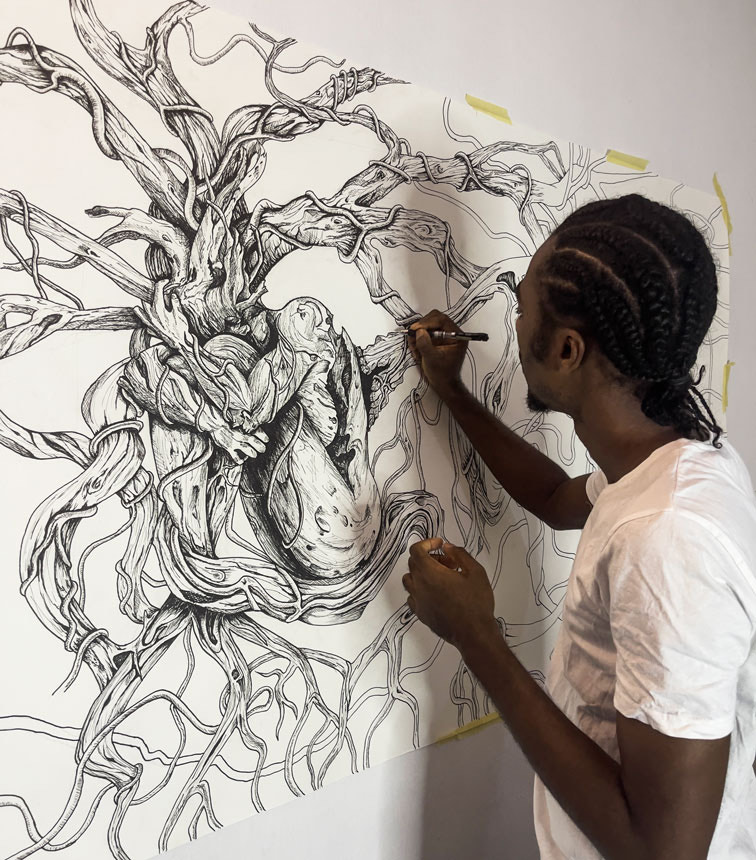Yerins Abraham is a Ukrainian-trained medical doctor, a musical artist, a visual artist, a tech entrepreneur, and a model. He is the founder and CEO of Giggle and Metart Africa. From his humble beginnings in a remote Nigerian village to his pioneering work in art, medicine, and technology, Yerins defies conventional labels, embracing the ethos of the polymath—mastering diverse disciplines with passion and precision. Yerins Abraham works at the convergence of art, science, and philosophy, questioning cultural norms and pushing audiences to redefine the limits of human potential. In this exclusive interview, Yerins shares his story, providing insights into his path of self-discovery as well as the significant impact of his experiences on his multifaceted approach to creativity and invention.
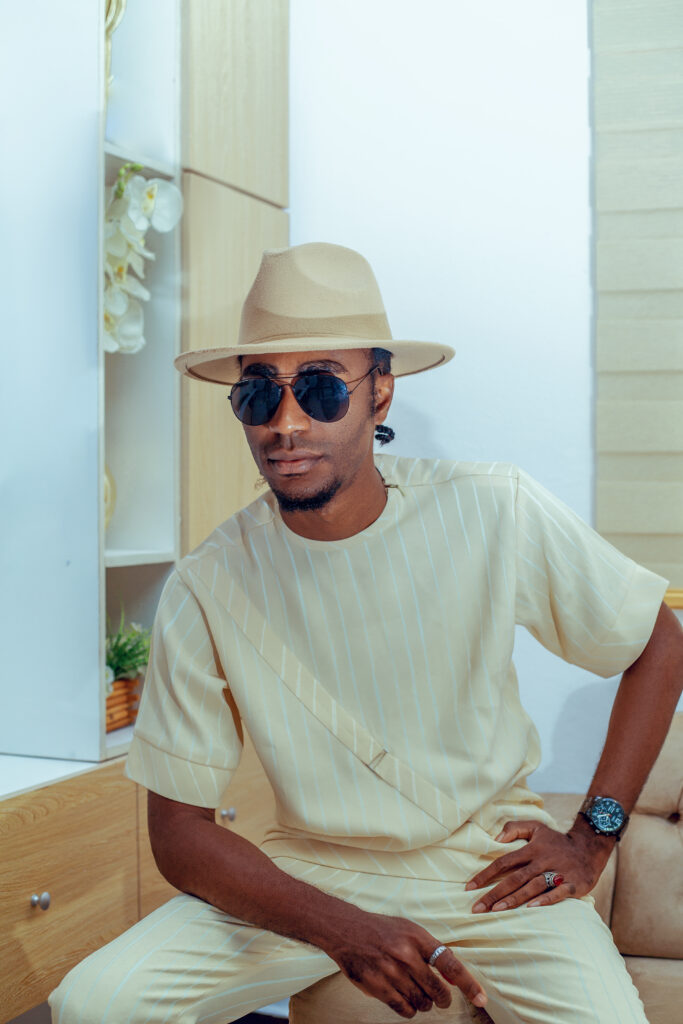
My creative process is gardening, not architecture… I anticipate mistakes, and when those mistakes happen, I see it as another way to create something new
Yerins Abraham
FAB: What’s your story?
Yerins Abraham: Growing up, I was very curious. I have always been a very curious person. I ask questions a lot, not necessarily from people, because over time I noticed that scaling questions could be annoying, but I still question things. If you tell me something, I’ll do my research.
I grew up in a village in the southern part of Nigeria. Growing up, you hear a lot of superstitions about things and their alleged consequences. Even if people believed it, I’d always question it in my mind. One of the questions is, “Why do people favour being specialists at something?”
I’ve always tried to be good at something. Luckily for me, at the age of seventeen, I travelled to Europe. Exploring Europe opened me to different experiences and helped me understand the kind of person I am and accept it. When I was there, I travelled around a bit before going to Ukraine to study medicine.
When I started studying medicine, my interaction with my teachers was amazing. I was the best student in class; I was doing my drawing. Here in Nigeria, if you’re studying medicine and you decide to venture into art or do things like dye your hair, they will say you are unserious. I was doing all those things, and I was doing well. Even the teachers loved my hair.
I decided that I couldn’t minimise who I am, so I researched people like me. It was in the fourth year when I was browsing about Da Vinci and I saw the term “polymath,” and it just completely blew my mind. I have taken that word as a theme for who I am. It’s a word that embraces the kind of person that I am. That’s my story. From there, everybody from my school in Europe now knows me as a polymath. That’s what I call myself. I do different things, but I don’t do all these things at once. I focus on one thing, and I do it 100 percent well.
Because of the kind of creative person I am, I cannot just be done with those things. If I want to express something, I look for the best medium. It can be through art, music, or tech. I code. I know how to programme very well. When I programme, I tell people around me that it’s still art. I am creating something that has never been created. It’s like I am drawing; in my mind, that’s how it feels. People might have to get into my mind to understand, but all these things are kind of similar, and at the same time, it’s just me expressing what I want.
FAB: How do you think the attitude of judging a book by its cover here in this part of the world has robbed us of our talents? What are some practical steps you think we can take to improve things?
Yerins Abraham: I talk about this a lot with people. As a person, I always try to see the bigger picture. I don’t judge. There’s a saying that there’s nothing like free will. Free will is an illusion. The idea is that we make our decisions based on our experiences, our past relationships, and our environment. No matter how unique or idle that idea might be, it is because of something. It is not an independent thought. That means that every single thing we experience in our environment is not because of one individual or one sector.
That brings me to why we try to stereotype a particular type of look. Our parents were very conservative in their time, and it helped them when they were young. Their parents were a little bit of ignorant liberals. Those ignorant liberals were the ones who laid the country’s foundation. They had a vision for the future of Nigeria, and because most of them get the best education, they wanted their children to. These children learned from their parents, who were ignorant liberals, that the best thing to do is get an education and a 9-5 job, dress up in a suit, and all that.
These were the events that led to the things going on now. These individuals did that, and it worked for them from the 1980s until the 1990s. Being a civil servant was a good thing. Our parents benefited from it. They were well paid, and they lived a good life. There were also individualists in our parents’ generation who thought more about themselves than the country in general. They weren’t about Nigerian passion or love. They were talking about taking care of their families. They are just now trying to put the same mentality on us. Unfortunately, it’s not like that anymore; times have changed. This generation is full of liberals, and they are mostly educated liberals. Educated liberals want to explore; they want to do so many things.
I know that we might have issues with the next generation. They might want to be something that we don’t know yet, but that’s just how it works. What we have to do is not tell them what to do. We should prove things to them.
My dad is a big-time conservative. He is a medical doctor, and that is what he has done all his life. He is a very intelligent man. Most of my cousins are medical doctors and are also very conservative. The only thing my dad would spend money on for me is schooling. Right now, he gives me freedom. When I came back to Nigeria and I had nothing, he helped me. I also wasn’t practicing medicine. Imagine someone spends millions on your medical school, and you come back to ask him for more money. The reason he did that was because of what I had proven myself to be.
If you’re an individual and you are dying your hair, things are hard for you. Try to push yourself. Try to have a good heart and just do what you have to do. People will see past the hair. They will see your true self, and those other things will fade away. Just do what you have to do. If it works out great, fine. If it doesn’t work out, you’ll learn.
Our parents were very conservative in their time, and it helped them when they were young… They are just now trying to put the same mentality on us. Unfortunately, it’s not like that anymore; times have changed
Yerins Abraham
Breaking Label
FAB: Is there any way that your experience in medicine influences your approach to art?
Yerins Abraham: It does. I studied medicine because I wanted to. People might think I felt pressured to study medicine because I come from a family of medical doctors, but that’s not true. I studied medicine because that was the only thing I couldn’t learn from home. I learned programming on my own. I’ve built three apps. The first app I built in Ukraine was sold for thousands of dollars. The company is a million-dollar company right now. I have exhibited and modelled in Paris.
I studied medicine because of my curiosity for the human body. When I started, I was very much into the heart, but later, I got into the brain. Despite the fact that I specialise in cardiology, I am now learning neuroscience. I spend a lot of time reading books on neuroscience. This is what excites me. Medicine does not have limitations. There are so many beautiful things to explore. The reason why I am very excited about learning neuroscience is because I want to understand the human brain and the numerous things we are capable of and not capable of. All those things intrigue me. That is just one of the fuels in my stories. It might not be direct, but it’s rooted in all my art and even the books I’m writing and the apps I’m building.
I have a dating app. I use what I learned from editing to talk about relationships, how a man would view a woman, and how different cultures play their own roles. Medicine has the highest school fees compared to other courses. It’s also very tedious, but it gave me the foundation to do everything else. If I were to go back in time, I would do the same thing.
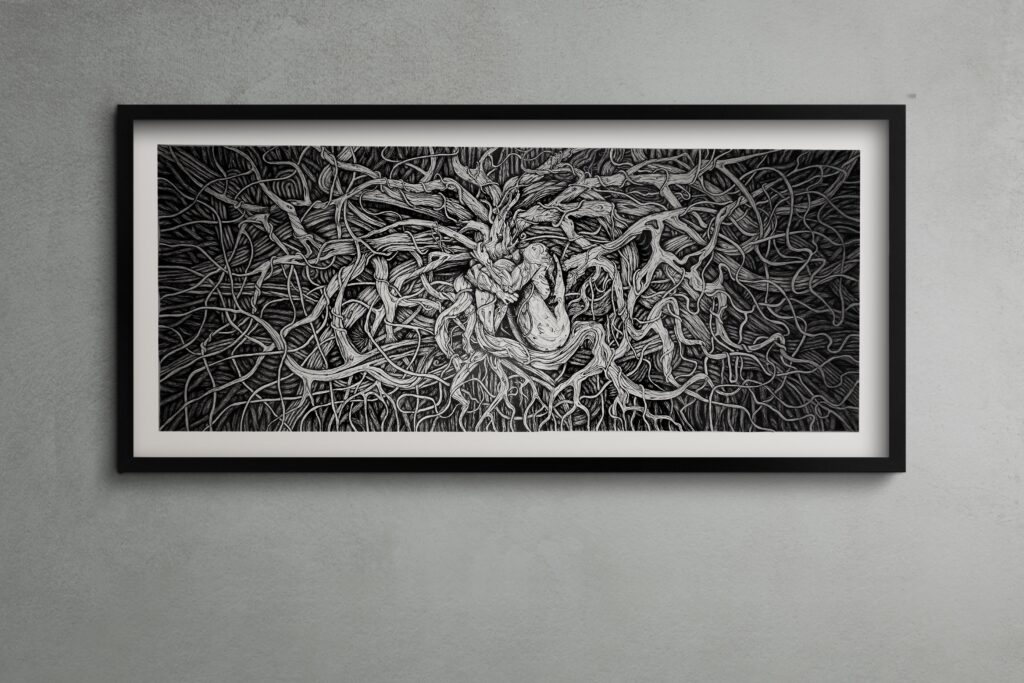
FAB: You have a work titled “Mother.” What’s the significance of your personal life?
Yerins Abraham: My first artwork was Index. This is my second artwork. I finished the first one in 2020. Since then, I’ve been trying to make more artwork. My first artwork is highly philosophical. I made that artwork out of fear. When I came back to Nigeria, everything was down for me. I wasn’t used to asking people for money, but I had to. There was COVID-19, and all my plans were ruined. I came to the conclusion that I had to do something mind-blowing during that period. I made that artwork. I was also writing a book at the time, so I made the artwork and published the book off the artwork. Since then, I’ve exhibited the artwork in a couple of countries, including Nigeria. Since then, I’ve been trying to create something, but it has not come to me.
Last year, I got an AT residency in Finland, and I declined it because I knew that if I travelled, I would not make what I wanted to make and I would hate it. When I went to the reality show and came back, there was this zeal to create something, to follow the trend, and all that. I tried, but I wasn’t going to make it work until I really felt it. Late last year, I was talking to someone, a mother, and she was just talking about the things that she goes through as a woman. Even as a medical doctor, I wasn’t prepared for it. It’s so normalized. I came back home, and I kept thinking about it.
Dreams take reality and a distorted kind of fantasy. I had a dream about the idea. I woke up, and that picture was in my head. I knew I just had to draw it. I have not had that feeling for four years, since 2020. I knew what I wanted to draw, but I didn’t know what the end would look like. There’s a whole story about Mother. It is about the fact that women are the source of every existence. I am not talking about humans alone. This includes animals. To keep their existence going, they have to go through pain. They say the second-most painful thing in the world is childbirth. People don’t talk about that a lot. There is a more articulated write-up about Mother, but that’s the centre of the whole idea.
FAB: How do you balance commercial viability with fulfilling your own passion and taste?
Yerins Abraham: Humans are social animals. People call me a genius, but I think that just one human cannot be a genius. I know it’s controversial, but even Albert Einstein is not a genius. I don’t believe one individual can be a genius because they share so many other elements built up for that one individual to flourish, and those elements are other human beings. Without those other human beings, that genius cannot exist. It is other individuals that build you up.
There’s something called pseudo-heroic fantasy that we have about geniuses and celebrities. If you look at the details of a person’s life, you see that it’s very possible to emulate that person. I have things that I don’t know how to do. I have a team. There’s this great philosopher who said that the best way to grow is to admit the things you’re not good at. I know the things I am not good at, and I try to put people in place to help me with the things I am not good at.
As a creative, I don’t really care about the business or the marketing side. I just want to create stuff, but I cannot survive like that. I am also a public figure, and I have to show my face. I have to be in public. I have a team that helps me.
There’s something called pseudo-heroic fantasy that we have about geniuses and celebrities… I have things that I don’t know how to do. I have a team
Yerins Abraham
FAB: What’s your creative process like?
Yerins Abraham: My creative process is gardening, not architecture. Architects draw their plans, and they build exactly what is planned according to the measurements. They don’t go with the flow. On the other hand, if you want to cultivate a garden, you will have to go with the flow. Once you picture a beautiful garden, you start to cultivate. Nobody draws the plan for a garden like in architecture. That’s how I approach my creative process. It slashed work so much for me because I anticipate mistakes, and when those mistakes happen, I see it as another way to create something new. When I create, especially with drawing, I try to turn mistakes into art. It’s the same way with musicians when they are writing their music. They don’t automatically know the next line.
FAB: What do you hope people take away from your garden (art)?
Yerins Abraham: I hope that my work stands the test of time. I hope that people get to have timestamps in their lives with my work. A person’s personal interpretation of my work is valid. That person has real-life experiences that brought about that interpretation, and the interpretation creates a connection between the person and the artwork.
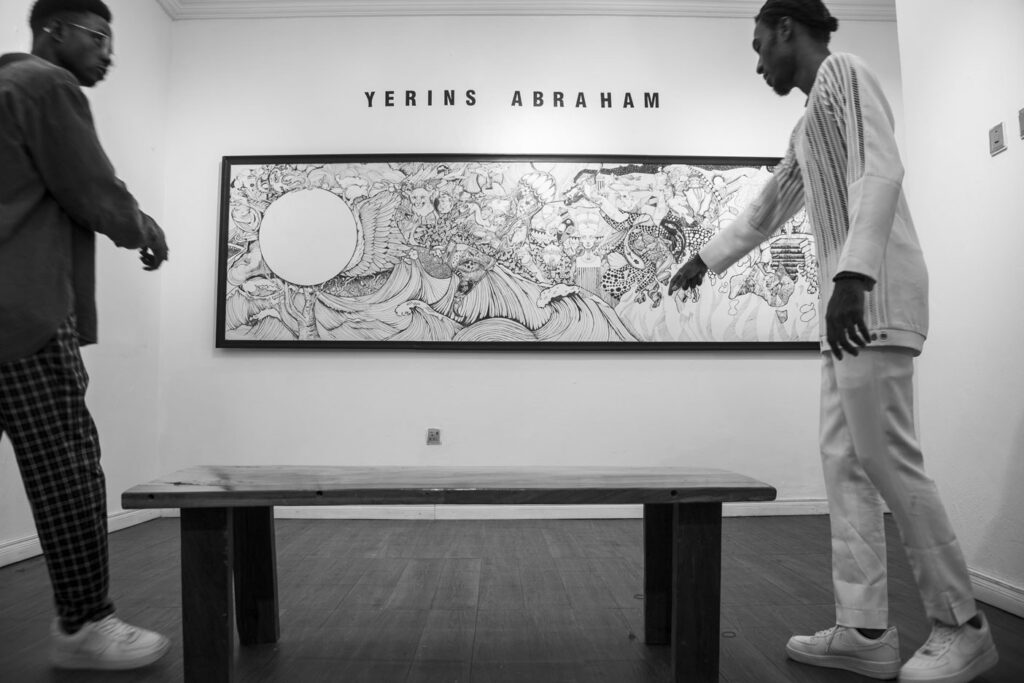
FAB: Do you have any upcoming exhibitions or brands that you hope to launch?
Yerins Abraham: I am about to complete my new book. It’s called “Life is Random.” For the artwork, I’m just out there having conversations with people. The first stage of everything is to create. When I create, I know that they will be there for the rest of my life and after I’m gone. I don’t have guaranteed exhibitions yet, but I’m in talks with galleries. I have a couple of businesses I’m running. I have two apps I’m running.
FAB: When should we expect the dating app?
Yerins Abraham: The dating app is out. There are ten thousand users on it right now, and we’re updating it to put it on playstore. I have a team working on it. I have a blockchain platform as well. I have a team helping me with things.
Fashion, Beauty, and Fitness with Yerins Abraham
FAB: What’s your hair routine?
Yerins Abraham: To be honest, I am the most natural person. I go to the salon to wash with shampoo, but that’s all I do. I’m blessed naturally with thick, dark hair. I haven’t dyed my hair or relaxed it. My hair grows pretty fast, and that’s one of the reasons I decided to keep it. I just do the most basic things with my hair. I haven’t used body cream in a very long time. I’m very basic. That’s just the way I am.
FAB: How do you incorporate colour into your wardrobe?
Yerins Abraham: My stylist does that, but I have this love for sky blue and black. I try to always add those colours to most things I do or wear. I just leave it to my stylist. I always want people to give me their own creativity too.
FAB: How do you incorporate mindfulness into your fitness routine?
Yerins Abraham: I meditate, and I pace. I meditate in the morning, and I learned it because I studied Buddhism. I understand a couple of their terms. Their understanding of life is very unique. Meditation helps me a lot. Pacing helps me a lot too. When I take a stroll, I talk to myself. Talking to people about things in my head could destroy my zeal if their feedback is discouraging. I prefer to just talk to myself, and I learn. You shouldn’t be scared of talking to yourself; you should be scared of the confidence you have to dare talk to yourself about things and get things done. The bad thing about talking to people is that you have reduced confidence about starting a certain thing. I talk to myself, and I meditate in the morning and sometimes in the evening.
Fun Zone: #FABFastFive
- FAB: If you were stuck on a deserted island and had to choose something as a company, what would that be?
Yerins Abraham: Chessboard
- FAB: If you could have dinner with any renowned artist, who would that be?
Yerins Abraham: Leonardo Da Vinci
- FAB: If you could choose a superpower, what would you choose?
Yerins Abraham: Read minds.
- FAB: What’s that one thing you can’t buy to do over the weekend?
Yerins Abraham: Pacing
- FAB: If you’re to choose one meal to eat for the rest of your life, what would that be?Yerins Abraham: Egusi soup








